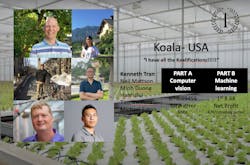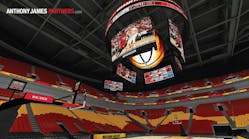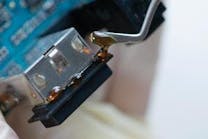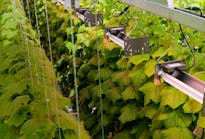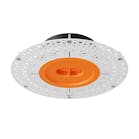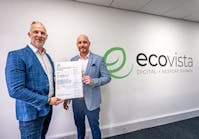The U.S.-based team 'Koala' has won the Online Challenge, the first phase of the 3rd edition of the International Autonomous Greenhouse Challenge, organized by Wageningen University & Research (WUR) and Tencent. This was announced during a webinar this afternoon at the conclusion of the Online Challenge. A team from South Korea and China came second and third. During the Online Challenge 46 teams from 24 countries grew virtual lettuce with the help of artificial intelligence, and evaluated images of lettuce in different growth stages.
Team 'Koala' receives a wild card that grants them access to the next phase of the Autonomous Greenhouse Challenge, the greenhouse experiment that will start early 2022. Participating teams will then each have a WUR greenhouse department at their disposal to grow lettuce fully autonomously in reality.
Connection between AI and food production
Due to the ever-growing world population, the demand for fresh and healthy vegetables is increasing. Autonomous greenhouses can ensure that more people are fed with vitamin- and mineral-rich products. In addition, these techniques contribute to increasing food safety and a higher production volume of healthy vegetables, using fewer resources such as water and energy. Its potential has been successfully demonstrated in previous editions of the Autonomous Greenhouse Challenge.
The tasks in the Online Challenge
In the Online Challenge, teams had to solve two tasks:
In part A - the computer vision challenge - teams developed computer vision algorithms based on training images of lettuce plants. They then used the algorithms to detect growth parameters such as diameter, height, weight and leaf area.
In part B - the machine learning challenge - teams developed machine learning algorithms to control the climate in a virtual greenhouse. Algorithms had to automatically determine set points for ventilation, heating, lighting, etc. in order to grow a virtual lettuce crop and maximize the net profit.
The winners of the Online Challenge
Team 'Koala' from the U.S. won the Online Challenge. They achieved a total of 85 (out of 90) points, and were first in the machine learning challenge (with 45 points) and sixth in the computer vision challenge (with 40 points). The team built an algorithm that realized a virtual net profit of €8.68 per m2 and cultivation period in a simulator that produced virtual lettuce plants in a virtual greenhouse. In addition, their computer vision algorithm was able to recognize lettuce images with a high accuracy (total error=0.094) and estimated the correct growth parameters of lettuce plants.
Team captain of team 'Koala' is Kenneth Tran, he also led the winning team 'Sonoma' in the first edition of the Autonomous Greenhouse Challenge in 2019. Congratulations to him and all team members (Neil Mattson, Minh Duong, Hanh Bui, Tim Shelford and Michael Eaton) with this first place. The motto of team 'Koala' - "I have all the Koalifications" - seemed apt. Team 'Koala' will receive a wild card to participate in the next phase of the Autonomous Greenhouse Challenge, the greenhouse experiment that will start early 2022. Participating teams will then each have a greenhouse department to their disposal at the business unit Horticulture of WUR in Bleiswijk to grow lettuce fully autonomously in reality.
In total 46 teams from 24 countries, 286 participants took part in the Online Challenge! Second was team 'CVA' from Korea led by Hee Kyung Ryoo, third was team 'IUACAAS.ICANnettuce' from China led by Xiao Yang. More information about all teams and all results can be found on our website www.autonomousgreenhouses.com.
Lettuce images were made available by WUR and will also be made publicly accessible after the Autonomous Greenhouse Challenge. The simulator used for a virtual lettuce greenhouse and cultivation has also been developed by WUR and will be made accessible again to participating teams in the next phase of the Autonomous Greenhouse Challenge.
What is next?
The qualification for the next phase of the 3rd edition of the Autonomous Greenhouse Challenge will take place in November. A selection will then take place in the form of a 24-hour Hackathon, the best 5 teams will continue the challenge and will have a greenhouse compartment at their disposal to grow lettuce in reality. Old and new teams can register for the following phase from July 16 onwards. More information about the rules, admission requirements and registration can be found at www.autonomousgreenhouses.com.
Thanks to our sponsors: Fluence by Osram, Gebr. Geers bv, Hortiplan, Municipality of Lansingerland, Glastuinbouw Nederland, Kas als Energiebron, LetsGrow.com, Ridder, Sigrow and Tencent.
Focusing on the mission ‘To explore the potential of nature to improve the quality of life’, Wageningen University & Research (WUR) combines fundamental and applied knowledge in order to contribute to resolving important questions in the domain of healthy food and living environment. Over 6,500 employees (over 5,500 fte) and more than 12,000 students are inspired by nature, society, and technology and tackle the issues with an open and curious perspective. This inspiration has enabled WUR to be amazed, develop knowledge, and apply this knowledge internationally for over a century. We collaborate with governments, companies, non-governmental organisations and other research institutes.
Contact:
Silke Hemming - Head, Scientific Research Team
Greenhouse Technology
WUR
